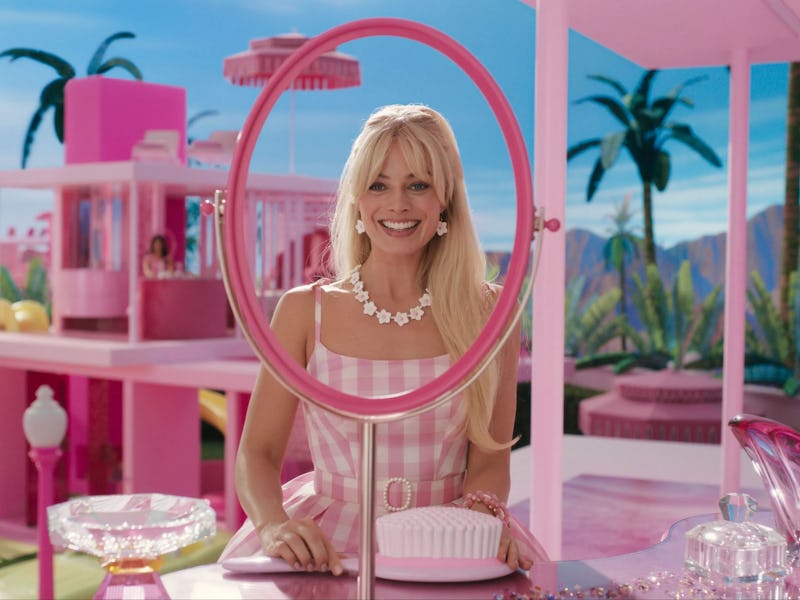Epic Barbie Theory Reveals the Ancient Philosophy Behind the Movie’s Big Twist
Barbie may seem candy-colored and perfect, but the entire conceit is incredibly philosophical.

Barbie is a toy that exists through imagination, a collective illusion we all buy into of a gorgeous, fun-loving blonde who can be a politician, a scientist, and a veterinarian, and still have time to go on a date with Ken at the end of the day. That’s why it makes perfect sense that Barbie lives in an imaginary dream world where the pools are plastic and the mirrors have no glass.
But why is this? Does Barbie live in a perfect utopia? An unusually philosophical new fan theory suggests that Barbie’s world isn’t just ideal according to Barbie — it’s also ideal according to one of the greatest thinkers who ever lived. Intrigued? Grab your pinkest pair of shoes and a philosophy textbook, and let’s dive in.
BarbieLand is ideal because it exists not as an actual town but as the Platonic ideal of the town.
Redditor u/aslfingerspell argues that BarbieLand isn’t just an alternate reality where Barbie is real, it’s also a world that embodies Plato’s Realm of Forms — a land where everything exists not as a literal thing but as the Platonic ideal of itself.
Platonic ideals are essentially the core essence of a thing. Your smartphone isn’t always the same thing because it is constantly changing with every passing moment (a scratch here, a software update there), but at its core is the abstract concept of “smartphone.” Barbie is the Platonic ideal of a woman in society: professional, beautiful, and having it all. So of course she would live in a world where everything is just as abstract, perfect, and ineffable as her.
There’s no water in the shower because that would never be as perfect as the idea of a shower. There’s no real toothpaste because Barbie doesn’t brush her teeth, she evokes the concept of teeth brushing. (When Inverse called Barbie “The Platonic Ideal of an IP Movie,” we meant that it evokes the core concept of the subgenre — a work dedicated to an existing property — without the pitfalls and realities of other examples.)
The theory points to one main aspect of Barbie as the biggest piece of evidence: every Barbie is the only one of its kind. Margot Robbie plays Stereotypical Barbie, who presumedly would exist in our world as hundreds of thousands of dolls, each being played with a different girl. Yet, in BarbieLand, she exists as herself, the platonic ideal that is at the core of all those dolls.
You may make fun of Ryan Gosling’s Ken saying his job is Beach, but it’s the perfect encapsulation of this concept. His job isn’t something tangible, because nothing in BarbieLand is tangible. His job is the concept of Beach, just as his identity is the concept of Ken. He can’t swim, but he doesn't have to: he just has to embody the concept of Beach. (The waves are plastic anyway.)
His job is Beach. The Platonic ideal of Beach.
So how does this change the way we think of Barbie? It explains why the changes in BarbieLand affect the real world. When the platonic ideal of the Dream House becomes the Mojo Dojo Casa House, the toys that evoke the Dream House ideal now evoke the Mojo Dojo Casa House ideal.
But its greatest effect on the film is hiding in plain sight. Though Ken and Barbie are boyfriend and girlfriend, they aren’t physically affectionate at all. Though they are close, their relationship is entirely platonic. Of course, they can’t really be romantic — they can only evoke the concept of romance: the labels, the appearance, but not the actual thing.
Maybe this is why Barbie is the blockbuster behemoth it is. It’s not about the origin of Barbie, it’s not about the real-life Barbie the toy is based on, it’s about the Platonic ideal of Barbie, the “Stereotypical Barbie” we imagine when someone says the name. It’s about the concept of Barbie that everyone has experience with, whether that’s through complex play situations or just through the cultural zeitgeist.